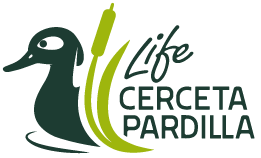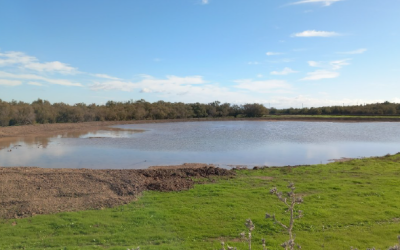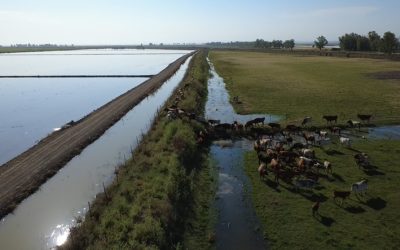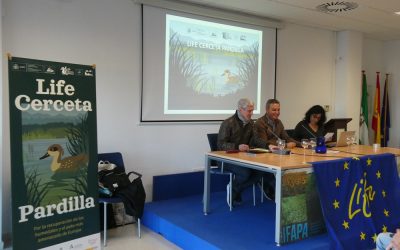
The marbled duck is one of the seven species at critical risk of extinction in Spain
The number of breeding pairs in Spain, virtually the only remaining area of occurrence in Europe, was 74 pairs in 2020 and in decline. Habitat loss and degradation are the greatest threats for survival of the species. These wetlands are suffering the impacts of drought, pollution, the proliferation of artificial barriers and other threats caused by human activities.
News
Restoration works completed at Finca Carnicera to improve the habitat of the marbled teal
The LIFE Cerceta Pardilla project has completed habitat restoration works at Finca Carnicera, located in the Brazo del Este Natural Area in Seville. This site...
Virtual fencing technology tested for livestock in wetland habitat management
As part of the LIFE Cerceta Pardilla project, a technology has been successfully tested to improve habitat management for protected species in wetlands: the...
Andalusia hosts a technical workshop to review the LIFE Cerceta Pardilla project in the region
The Department of Sustainability and Environment and the Environmental and Water Agency, both entities belonging to the Andalusian Government and partners of...
The species

The marbled duck is one of the most representative breeding duck species in Spain. It is characterised by its small size, the dark patch around the eye, its spotted plumage and its crest or “topknot” on the nape, which is more visible on males.
Its European population is almost exclusively confined to wetlands in Spain, such as the Guadalquivir or the El Hondo marshes and Santa Pola salinas (salt pans) on the Mediterranean coast. Indeed, the marshes and lagoons of Andalucía, Murcia and Valencia are the most important regions in Europe inhabited by this small masked duck.
The degradation and loss of natural wetlands, its habitat, are endangering its survival and future
Video
Actions
In order to try and reverse the dramatic current situation of the marbled duck populations and its habitats, we have commenced a series of research, conservation, governance and awareness-raising actions.
Communication activities will be developed to spread news about the project’s results and to promote knowledge about the species.
With the LIFE Cerceta Pardilla, Spain will not only conserve one of the most emblematic duck species of our country, currently at risk of extinction, but also one of the most important ecosystems for the planet’s health, which is among our principal allies in the fight against climate change: wetlands.



